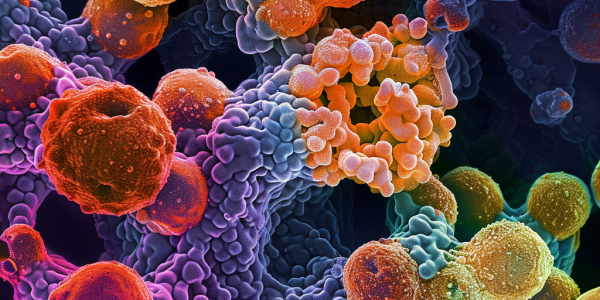Study Reveals How Protein Synthesis Errors Drive Tumor Growth
A groundbreaking study from the Indian Institute of Science reveals how errors in protein synthesis, specifically mRNA readthrough, can significantly impact tumor growth. Led by Associate Professor Sandeep Eswarappa, the research highlights the role of the FEM1B gene in regulating the cell cycle and its implications for cancer treatment. By utilizing CRISPR technology, the team demonstrated that targeting mRNA sequences may offer new therapeutic avenues to combat uncontrolled cell proliferation in cancer.
Revolutionizing Cancer Treatment: The Rise of Innovative Vaccines
The landscape of cancer treatment is evolving with innovative vaccines designed to combat various cancers. These therapeutic vaccines harness the immune system to target tumors, with promising advancements in personalized cancer vaccines showing encouraging results in clinical trials. The NHS is exploring the integration of these vaccines into treatment protocols, highlighting a shift towards precision medicine. As research progresses, cancer vaccines could become a cornerstone of oncology, improving patient outcomes and survival rates.
Electrical Currents Enhance NK Cell Efficacy in Cancer Treatment
A groundbreaking study published in Cell Reports Physical Science reveals that tumor treating fields (TTF) can enhance the efficacy of natural killer (NK) cells in fighting aggressive brain tumors like glioblastoma. Conducted by researchers from Trinity College Dublin and the University of Cambridge, this innovative approach shows promise in improving cancer treatment outcomes by combining electrical currents with immunotherapy. The findings suggest TTFs could serve as an effective adjunct therapy, potentially revolutionizing treatment protocols for hard-to-treat cancers.
Retired School Principal Shares Inspiring Sarcoma Survival Story
Read Stephen McDonnell’s inspiring story of survival during Sarcoma Awareness Month. Learn how Dr. Nicole Fowler played a pivotal role in his recovery from a rare and aggressive sarcoma near his thyroid. McDonnell’s journey highlights the resilience and courage needed to overcome unexpected health challenges.
Grandmother’s Routine GP Visit Reveals Devastating Cancer Diagnosis
Read about Esther Shoebridge’s devastating diagnosis of myeloma after seeking relief for a ‘cricked’ neck. Despite seemingly innocuous symptoms, she was shocked to discover ‘millions of holes’ and tumors scattered throughout her body. Esther’s journey highlights the importance of early detection and proactive healthcare in battling this relentless disease.
Scientists Discover Novel Approach to Combat Cancer Drug Resistance
Scientists have made a groundbreaking discovery in the fight against cancer by finding a way to manipulate cancer cells to turn against themselves, potentially revolutionizing cancer treatment. A recent study introduced a novel approach to combat cancer drug resistance by modifying lung cancer cells to make them more susceptible to treatment. This innovative approach holds promise in enhancing the efficacy of cancer treatments by sensitizing cancer cells to therapies and potentially overcoming drug resistance.
Student shares harrowing experience of being misdiagnosed with cancerous tumour
Read about Mia Robins’ harrowing experience of being misdiagnosed by doctors, leading to a cancerous tumour the size of a melon filled with hair and teeth. Despite alarming symptoms, Mia’s condition was repeatedly misdiagnosed until she was eventually diagnosed with ovarian cancer. Mia’s story emphasizes the importance of advocating for one’s health and challenging medical professionals when necessary.
Study Reveals Hidden Complexities in Liver Cancer Tumors
A recent study funded by the National Research Foundation Singapore revealed unexpected molecular heterogeneity within liver tumors, with more than 40% of hepatocellular carcinomas containing multiple molecular subtypes. Published in the Journal of Hepatology, the findings emphasize the importance of comprehensive sampling in studying and treating liver cancer to optimize patient outcomes. The ‘bad apple effect’ underscores the need for personalized treatment strategies to address the complexities of liver cancer and improve clinical outcomes.
Study Suggests Potential Link Between Tattoos and Blood Cancer Risk
Recent research suggests a potential link between tattoos and blood cancer, specifically lymphoma, with a 21% increased risk among individuals with tattoos. The study from Lund University in Sweden highlights the presence of carcinogens in tattoo ink, which may trigger inflammation linked to cancer development. Contrary to previous studies, the latest research found a correlation between tattoos and lymphoma, emphasizing the importance of informed decision-making regarding body art and health considerations.
Rising Cases of Penile Cancer and Amputations in Brazil
Learn about the rise in penile cancer cases in Brazil, with over 6,500 amputations in the past decade. Early detection is crucial to avoid drastic measures like partial or total amputation. Discover the emotional and physical challenges faced by patients like João, whose experience highlights the life-altering impact of penile cancer treatment.










